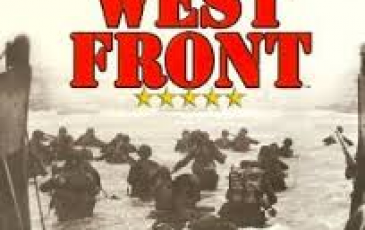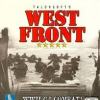Agony in the Huertgen Forest - The Matrix Games version of West Front

| Rating: | 4.2 (2) |
| Games Played: | 1 |
| SM: | 6 |
| Turns: | 90 |
| Type: | Custom |
| First Side: | Allies |
| Second Side: | Axis |
| Downloads: | 93 |
2-15 November 1944
Stretching Belgian German border, the Hürtgen Forest (Ernest Hemingway called it 'the Passchendaele with tree bursts') covers an area of about fifty square miles within the triangle formed by the towns of Aachen, Monschau and Düren. As the northernmost part of the mountainous Eifel region, it is, one big wooded plateau, sliced into ridge by numerous streams. From a point north of Aachen to south of the Hürtgen Forest, the Siegfried Line divided into two separate belts, the Scharnhorst Line and the Schill Line. Holding this part of the front of Generalfeldmarschall Walter Model 's Heeresgruppe B was the 7. Armee, led by General Brandenberger. The Germans stubbornly defended the forest for four reasons. Firstly, the difficulties of its terrain made it ideal for defence by a small but resolute force; secondly, its position along the Belgian-German border offered an opportunity to block further enemy advance into Heimat territory; thirdly, unlike the Allies, the German High Command was acutely aware of the importance of the Roer Dams and holding on to them played a predominant role in their thinking; and fourthly, delaying the enemy west of the Roer was essential for gaining the time needed for the massive build-up behind that river for the great Ardennes counteroffensive which was planned for December. 6 American infantry divisions and one armoured division - some 120,000 men - had fought there. Two factors had caused the Americans to keep feeding one division after another into the Hürtgen meat grinder: firstly, the fear that the forest might, like the Argonne Forest in the First World War, conceal an enemy assembling for a counter-attack into the flank; secondly, the continued hope that, with dwindling German reserves, one more fresh Unit would do the trick. The Historicals called the fighting in the "The Green Hell" worse than anything else on the West Front, and compared it in intensity to the battles of attrition conducted during the last two years of World War I.
Stretching Belgian German border, the Hürtgen Forest (Ernest Hemingway called it 'the Passchendaele with tree bursts') covers an area of about fifty square miles within the triangle formed by the towns of Aachen, Monschau and Düren. As the northernmost part of the mountainous Eifel region, it is, one big wooded plateau, sliced into ridge by numerous streams. From a point north of Aachen to south of the Hürtgen Forest, the Siegfried Line divided into two separate belts, the Scharnhorst Line and the Schill Line. Holding this part of the front of Generalfeldmarschall Walter Model 's Heeresgruppe B was the 7. Armee, led by General Brandenberger. The Germans stubbornly defended the forest for four reasons. Firstly, the difficulties of its terrain made it ideal for defence by a small but resolute force; secondly, its position along the Belgian-German border offered an opportunity to block further enemy advance into Heimat territory; thirdly, unlike the Allies, the German High Command was acutely aware of the importance of the Roer Dams and holding on to them played a predominant role in their thinking; and fourthly, delaying the enemy west of the Roer was essential for gaining the time needed for the massive build-up behind that river for the great Ardennes counteroffensive which was planned for December. 6 American infantry divisions and one armoured division - some 120,000 men - had fought there. Two factors had caused the Americans to keep feeding one division after another into the Hürtgen meat grinder: firstly, the fear that the forest might, like the Argonne Forest in the First World War, conceal an enemy assembling for a counter-attack into the flank; secondly, the continued hope that, with dwindling German reserves, one more fresh Unit would do the trick. The Historicals called the fighting in the "The Green Hell" worse than anything else on the West Front, and compared it in intensity to the battles of attrition conducted during the last two years of World War I.
| Player Voting Stats | ||
|---|---|---|
| Member | Balance | Enjoyment |
| Moderately Pro Allies | 8 | |
| Totally Pro Axis | 5 | |
| Gaming Records | |||||||||
|---|---|---|---|---|---|---|---|---|---|
| 1st Side Player | 2nd Side Player | Result | Score | ||||||
 |
David Galster | vs. | L.CHIEI |  |
Allies Major Victory | 72 | 12 | ||





















